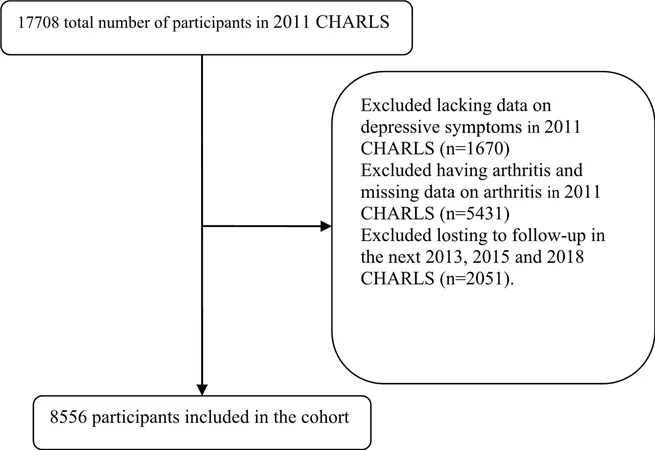
How Depression Influences Arthritis: A Study Reveals Alarming Connections
2024-11-05
Author: Liam
Introduction
Arthritis, whether acute or chronic, significantly impacts millions of individuals worldwide, leading to persistent pain and disability. A staggering 154.4 million people over the age of 45 in China are plagued by this condition, illustrating an urgent global health crisis exacerbated by an aging population. With approximately 55% of arthritis sufferers being older than 55, understanding the multifaceted challenges of this disease has never been more critical.
Mental Health Crisis
In tandem with physical ailments, mental health conditions, particularly depression, have emerged as an alarming issue within the global community. The World Health Organization’s 2022 report indicates that around one in eight individuals globally suffer from mental disorders, most of whom reside in low- or middle-income countries (LMICs). In China, the prevalence of depressive symptoms among individuals aged 45 and older hovers between 30-43%, highlighting an urgent need for intervention.
The Bidirectional Relationship
Studies show a staggering association—individuals with arthritis have a heightened vulnerability to depression, but increasingly, researchers are unveiling the reverse: depressive symptoms may also increase the risk of developing arthritis. A landmark cohort study from Taiwan establishes a bidirectional relationship, affirming that as mental health deteriorates, so does physical health. Recent findings suggest that worsening depression can heighten the likelihood of knee osteoarthritis, but the overall association remains muddied by conflicting research; some studies find no link between arthritis and depression.
The China Health and Retirement Longitudinal Study (CHARLS)
The China Health and Retirement Longitudinal Study (CHARLS), which encompasses data from 8556 participants over nearly a decade, sheds more light on this intricate relationship. The research aims to explore how changes in depressive symptoms may influence the onset of arthritis. The clearer hypothesis here is that worsening depression increases arthritis risk, while improvements in mental health correspond to lower risks.
The Findings
1. **Significant Statistics:** Out of 1129 individuals developing arthritis within the study's timeframe, those with depressive symptoms faced a staggering 66% higher rate of arthritis compared to their non-depressed counterparts. Furthermore, each unit increase in depression score indicated a 4% rise in the chance of arthritis onset.
2. **Depression and Arthritis:** Participants who reported improvement in depressive symptoms had a 25% lower risk of developing arthritis over eight years, showcasing that mental well-being plays a fundamental role in physical health.
3. **Worsening Symptoms:** Conversely, those who experienced new-onset depressive symptoms were identified as having a 66% greater likelihood of arthritis development, underscoring the powerful link between mental and physical health.
4. **Broader Implications:** Given this intricate interplay, medical practitioners are urged to recognize depressive symptoms as significant risk factors for arthritis. Implementing robust screening measures and offering therapy that targets mental health can potentially reduce the prevalence of arthritis, particularly in at-risk populations.
Conclusion: A Call to Action
The findings from CHARLS illuminate a critical interplay between depressive symptoms and arthritis, emphasizing the importance of mental health in managing physical conditions. With arthritis on the rise due to aging populations and escalating mental health issues, healthcare systems globally must prioritize these connections in public health strategies. Developing comprehensive plans to address mental health can contribute to a remarkable decrease in arthritis cases, ultimately fostering safer, healthier communities.
Stay tuned as we continue to explore groundbreaking studies that may reshape how healthcare approaches the dual challenges of mental and physical well-being. Don't let your depression go unnoticed—your joints may depend on it!









 Brasil (PT)
Brasil (PT)
 Canada (EN)
Canada (EN)
 Chile (ES)
Chile (ES)
 España (ES)
España (ES)
 France (FR)
France (FR)
 Hong Kong (EN)
Hong Kong (EN)
 Italia (IT)
Italia (IT)
 日本 (JA)
日本 (JA)
 Magyarország (HU)
Magyarország (HU)
 Norge (NO)
Norge (NO)
 Polska (PL)
Polska (PL)
 Schweiz (DE)
Schweiz (DE)
 Singapore (EN)
Singapore (EN)
 Sverige (SV)
Sverige (SV)
 Suomi (FI)
Suomi (FI)
 Türkiye (TR)
Türkiye (TR)